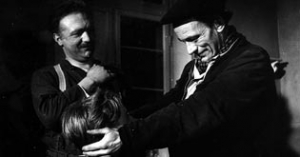Summary
Rotation
The film focuses on the laborer Hans Behnke, who has finally become a machine supervisor at the rotary press of a big publishing house after long, hard years of unemployment. He does not really like the Nazis, but when they come to power he follows the path of least resistance, ending up a party member.
It is not until a confrontation with his brother-in-law, a communist in the active resistance, and the outbreak of war that he begins to think and act. He helps to set up a printing machine for illegal leaflets. His son – entangled in persecution and confusion as a result of a fascist education – denounces him, he is arrested, and sentenced to death. By chance, he survives the war, but his wife is killed. When his son returns from a prisoner-of-war camp, hesitant and uncertain whether his father will take him in, Behnke knows that he must face the future side by side with the young man – as the older generation bears the greater responsibility for the tragedy of the German youth.
Source: German films Service & Marketing GmbH

Comments
You have seen this movie? We are looking forward to your comment!
Login or register now to write a comment.